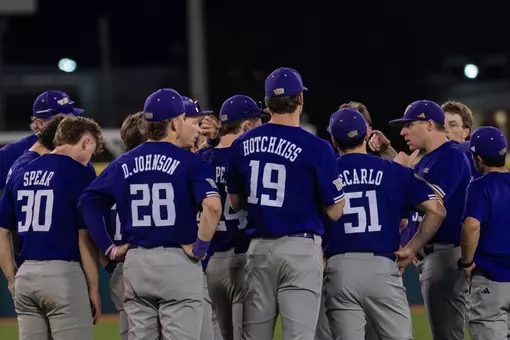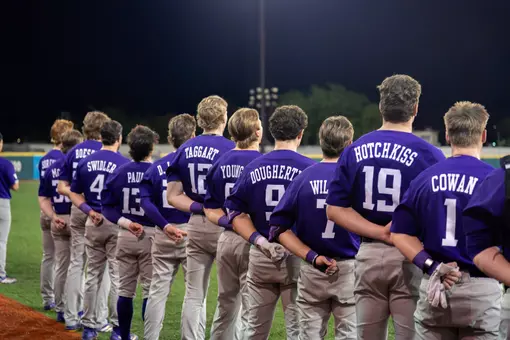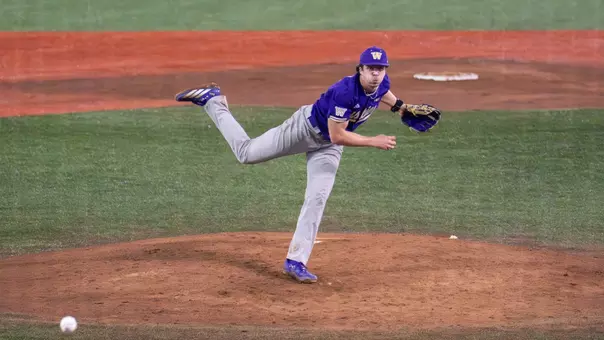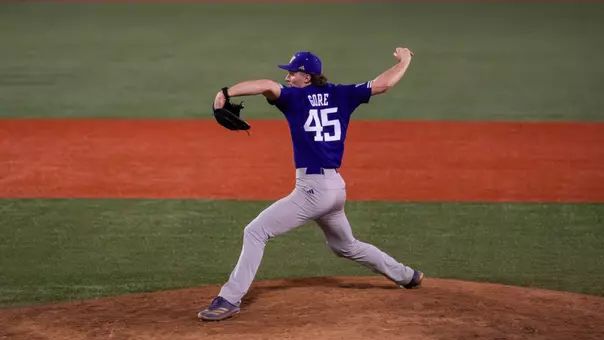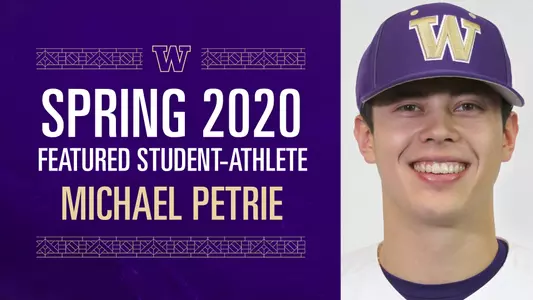
Sustainability's Featured Student-Athlete: Michael Petrie
April 21, 2020 | Baseball, Sustainability
Q&A with UW Student-Athlete, Michael Petrie
Question: What does "being sustainable" mean to you personally?
Michael: Being sustainable means making an intentional effort to do your part in reducing your carbon footprint and spreading awareness of sustainable practices. I consider myself an advocate for sustainability because I want to share my experiences of healthy lifestyle changes. During the fall of my sophomore year, I took a class on sustainability and learned about the responsibility of the government, businesses, and individuals to practice and promote environmental consciousness.
Q: What steps have you been taking in your own life to be more sustainable, and how do those impact you on a daily basis?
M: I've found many sustainable practices are also connected to living a healthier, simpler lifestyle. Many of these decisions relate to my food consumption.
I try to cook for myself as much as possible so I know exactly what is going into my foods, and I can limit single use containers. This has helped me achieve a strong balance in my diet, and helps me get the most out of my training.
When I do go out to eat with friends, there are many restaurants and food shops in Seattle that also prioritize their environmental impact.
It's really important to support local foods by buying locally sourced groceries. In contrast to large commercial farms, small scale, local farms offer several environmental, economical, and health benefits because they generally practice more ethical and sustainable agriculture practices. Generally speaking, local farmers are more intentional and efficient in using their land space and water. Also, locally grown food reduces transportation miles which cuts down on carbon emissions and the use of pesticides.
Q: With the creation of the new student athlete sustainability group at UW (SAWS), there will hopefully be plenty of opportunities for future UW athletes to get involved with sustainability. What kinds of initiatives or projects would you like to see the group take on in the future?
M: Just as our nutritionists and chefs educate our athletic department on healthy food choices, I hope we can use PNC and Conibear to educate our athletes on sustainable consumption practices. On top of projects and initiatives, I hope SAWS can spread passion for sustainability to the next wave of athletes at UW, and the Seattle Community.
Q: Lots of areas of the country are still not up to par with modern sustainability efforts, or at all for that matter. Having grown up in the area, I'm sure that environmental sustainability has been something that you've been aware of for quite some time. What tips might you give to someone who is just learning how to be more sustainable?
M: For someone who is just learning about sustainability, I would tell them our consumption habits are somewhat related to our lifestyle habits, and overall, simpler is better. Also, food is a very powerful tool. Use it to bring people together.
Q: As a baseball player, has playing the sport and being outdoors influenced your interest in sustainability at all?
M: I've always had a strong passion for the outdoors, and I believe it is our collective responsibility to preserve the earth to the best of our abilities. Being on the baseball team has given me the opportunity to play and live in various parts of our country and witness how different communities practice and value sustainability. This has made me more passionate and aware of the importance for communities to adopt sustainable practices and continue to improve our way of living.
Q: What do you hope people will take away from reading this?
M: I hope people can learn that on top of our moral obligation to maintain environmentally conscious practices, there are also several selfish benefits, and that is a healthier, happier lifestyle.
Question: What does "being sustainable" mean to you personally?
Michael: Being sustainable means making an intentional effort to do your part in reducing your carbon footprint and spreading awareness of sustainable practices. I consider myself an advocate for sustainability because I want to share my experiences of healthy lifestyle changes. During the fall of my sophomore year, I took a class on sustainability and learned about the responsibility of the government, businesses, and individuals to practice and promote environmental consciousness.
Q: What steps have you been taking in your own life to be more sustainable, and how do those impact you on a daily basis?
M: I've found many sustainable practices are also connected to living a healthier, simpler lifestyle. Many of these decisions relate to my food consumption.
I try to cook for myself as much as possible so I know exactly what is going into my foods, and I can limit single use containers. This has helped me achieve a strong balance in my diet, and helps me get the most out of my training.
When I do go out to eat with friends, there are many restaurants and food shops in Seattle that also prioritize their environmental impact.
It's really important to support local foods by buying locally sourced groceries. In contrast to large commercial farms, small scale, local farms offer several environmental, economical, and health benefits because they generally practice more ethical and sustainable agriculture practices. Generally speaking, local farmers are more intentional and efficient in using their land space and water. Also, locally grown food reduces transportation miles which cuts down on carbon emissions and the use of pesticides.
Q: With the creation of the new student athlete sustainability group at UW (SAWS), there will hopefully be plenty of opportunities for future UW athletes to get involved with sustainability. What kinds of initiatives or projects would you like to see the group take on in the future?
M: Just as our nutritionists and chefs educate our athletic department on healthy food choices, I hope we can use PNC and Conibear to educate our athletes on sustainable consumption practices. On top of projects and initiatives, I hope SAWS can spread passion for sustainability to the next wave of athletes at UW, and the Seattle Community.
Q: Lots of areas of the country are still not up to par with modern sustainability efforts, or at all for that matter. Having grown up in the area, I'm sure that environmental sustainability has been something that you've been aware of for quite some time. What tips might you give to someone who is just learning how to be more sustainable?
M: For someone who is just learning about sustainability, I would tell them our consumption habits are somewhat related to our lifestyle habits, and overall, simpler is better. Also, food is a very powerful tool. Use it to bring people together.
Q: As a baseball player, has playing the sport and being outdoors influenced your interest in sustainability at all?
M: I've always had a strong passion for the outdoors, and I believe it is our collective responsibility to preserve the earth to the best of our abilities. Being on the baseball team has given me the opportunity to play and live in various parts of our country and witness how different communities practice and value sustainability. This has made me more passionate and aware of the importance for communities to adopt sustainable practices and continue to improve our way of living.
Q: What do you hope people will take away from reading this?
M: I hope people can learn that on top of our moral obligation to maintain environmentally conscious practices, there are also several selfish benefits, and that is a healthier, happier lifestyle.
Players Mentioned
AJ Guerrero breaks the UW home run record 👑
Friday, May 23
Business trip to Omaha 💼⚾️ #GoHuskies #baseball #pitcher
Wednesday, May 21
Washington 3, USC 1 | Huskies Highlights
Saturday, May 17
Washington 5, USC 3 | Huskies Highlights
Friday, May 16
